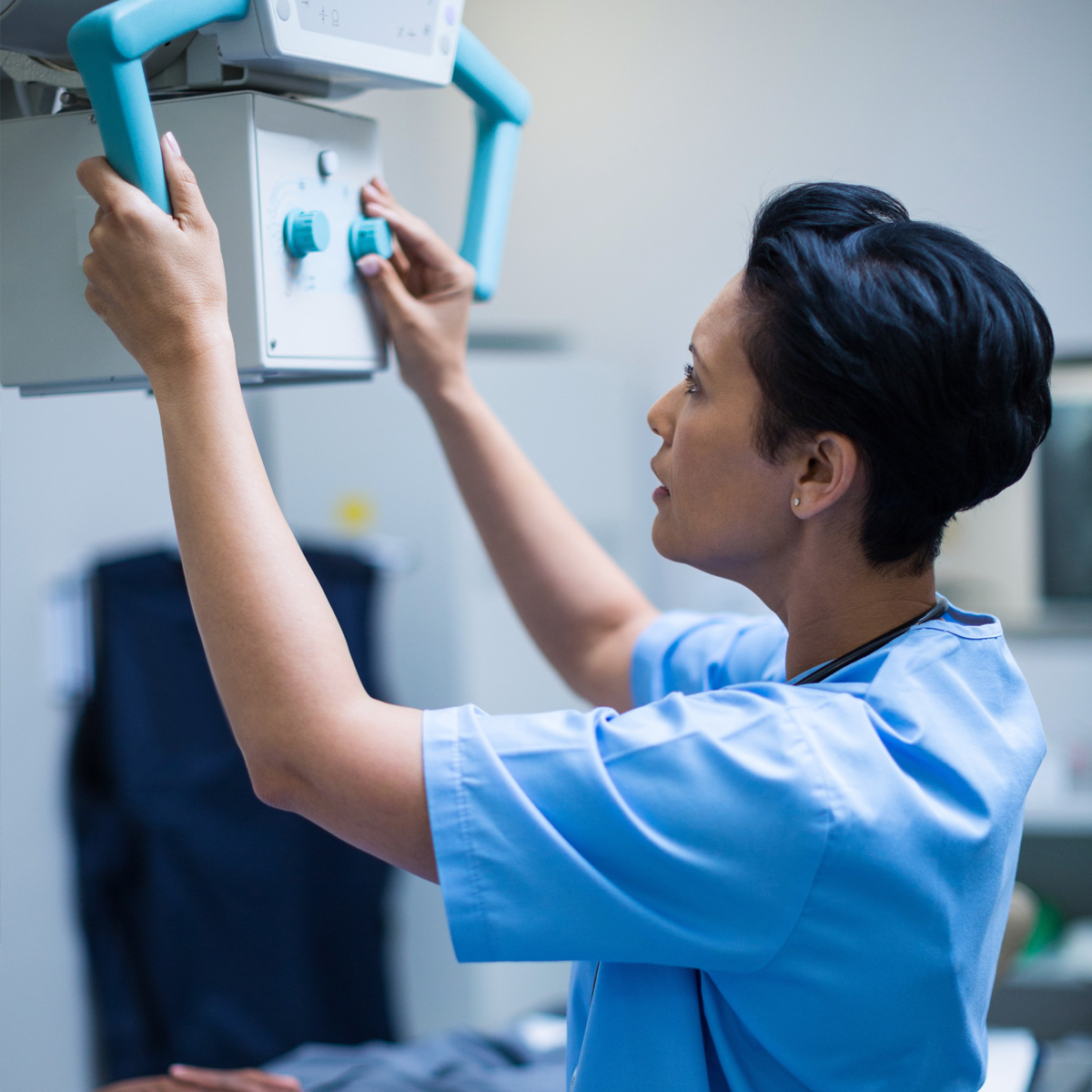Graduates of the program experience high ARRT exam pass rates, program completion rates and job placement rates. Students have access to multiple types of x-ray equipment for hands-on practice on campus, and receive a well-rounded clinical internship experience at both major hospitals and busy clinics. The program has been accredited through JRCERT since 1996.
The program is full-time, starts in the Fall, and spans 21 month/5 semesters. Instruction occurs primarily at the Arvada campus, but also via online coursework and clinical internship at medical facilities. To graduate, students must maintain a C grade or higher in all required coursework, and demonstrate clinical competency in all ARRT-required imaging procedures. Clinical internship occurs throughout the program. Basic clinical training is completed before students enter clinical rotation. A capstone registry review course is required during the final semester prior to graduation. Prospective students are encouraged to attend an info session and review the Student Handbook below.
The AAS degree in Radiologic Technology consists of 79 credit hours of pre-requisite and in-program coursework and is outlined in the Curricular Sequence Chart. Courses consist of online, hybrid, and in-person offerings. RTE 1001, 1031, 1032 and 2031 are offered online and may carry increased tuition and fees.
Join us for an informative info session for prospective x-ray, CT, and MRI students. We will cover general information, tips for applying, and FAQs. No RSVP needed.
RRCC is accredited by the The Higher Learning Commission (Commission on Institutions of Higher Education of the North Central Association of Colleges and Schools), and its programs are approved by the State Board for Community Colleges and Occupational Education and Colorado Community College System.
The Red Rocks Community College radiologic technology program is also accredited by:
The Joint Review Committee on Education in Radiologic Technology
20 North Wacker Drive, Suite 2850
Chicago, Illinois 60606-3182
312-704-5300
Email: mail.jrcert.org
The program's current accreditation award is 8 years (the maximum award term granted). For general program accreditation information and the current accreditation award letter visit JRCERT Accredited Program Details.
Visit the JRCERT website for information about the JRCERT Standards and the allegations reporting process.
Please see the Program Effectiveness Data for completion rates, ARRT pass rates and job placement rates.
- Number of graduates actively seeking employment may not be the same as the # of graduates in a particular year. JRCERT defines “not actively seeking employment” as graduates who do not report employment status, decline work for logistical reasons, are on active military duty, or are continuing their education.
Students are encouraged to meet with an advisor to discuss requirements
Admission to the radiologic technology program is highly competitive and requires admission to the college, pre-requisites, a separate radiologic technology program application, an interview, and an eligibility screening process. Pre-reqs may be in-progress at time of application, but must be completed by May of the program start year. See the Admissions Policies and Procedures for further details. Applicants must be 18 years of age to apply.
Multi-Phase Admissions Process
- Program Application Window: December 1-January 31
- Application Scoring: February
- Interviews: March
- Eligibility Screenings: June
- Offers of Acceptance: June
- Orientation: July
- Program Start: August
Interview
Based on application scoring, about 36 candidates will be offered an interview consisting of Q&A and other activities. Then based on interview performance about 20 candidates will be moved on to the eligibility screening process.
Eligibility Screening
To ensure eligibility to participate in the program, candidates must undergo a drug screen, background check, physical exam, and provide documentation of current vaccines, active health insurance, and BLS certification. Other physical and safety requirements may be assigned as needed. Candidates must be at least 18 years of age to apply. Candidates with Disqualifying Criminal Offenses or that do not meet the Technical Standards of the program may not be eligible for program entry.
PROGRAM APPLICATIONS ARE ACCEPTED DECEMBER 1 – JANUARY 31
Applications submitted outside of the application window, or that contain unreadable, missing, incomplete or incorrect information will not be considered.
START EARLY! Requirements may take several weeks or more to complete
STEPS TO APPLY:
- Apply to Red Rocks Community College and declare the AAS Radiologic Technology Degree
- Transfer completed pre-reqs to RRCC (if applicable)
- Submit program application
Application Contents:
*FOR SCORING CRITERIA AND APPLICATION TIPS, VISIT THE FAQ SECTION
1. Program Prerequisite Transcripts
- Prereqs may be in-progress at time of application, but must be completed by May of the program start year.
- Upload unofficial transcripts for all completed pre-reqs. Upload your RRCC transcript if it documents completed pre-reqs. If any completed prereqs are not listed on your RRCC transcript, upload transcripts from the institutions where those courses were completed.
- Transfer credit processing does not need to be complete at the time of application, but transfer credits must be submitted to Student Records by the end of December. To expedite processing, declare the AAS Radiologic Technology degree on your student record.
2. Two Letters of Recommendation
- Obtain letters in advance and upload them to the application
- No specific content requirements. References should write from their own experience and highlight what they believe best represents you as a candidate.
3. Personal Statement
- Radiography blends professionalism, technical skill, anatomical knowledge, and patient care. In 200 words or less, address the following:
- Which of these components resonate most strongly with you, and why?
- Describe a personal experience that sparked your connection to this area.
4. Resume
- Include any paid healthcare experience (optional) with position title, organization, and duties performed. Healthcare experience is defined as paid employment in a clinical, medical, or home-care environment as a member of a team of healthcare professionals.
5. Job Shadowing (optional)
- Candidate is responsible for securing their own shadowing
- 1 point for every hour completed, up to 10 hours
- Must be documented with this form and signed by a licensed radiologic technologist
Students will complete clinical internship at multiple sites, including major hospitals and busy clinics. While student’s preferred clinical sites are taken into account, final assignments are determined by the Clinical Coordinator. Most shifts are 8-10 hours during weekdays, but may include nights, weekends or overnights. Students provide their own transportation to clinical facilities. Most clinical sites are within a 20 mile radius of Denver, but students may attend sites within a 100 mile radius. Basic clinical training is completed on-campus before students enter clinical rotation. Our current clinical internship sites are listed on the JRCERT website.
Estimated Total Cost of Radiologic Technology Program: $15,600
Tuition: $10,280
Castlebranch Screening: $120
Fees: $4,000
Books: $800
Uniform: $300
AHA BLS Provider Certification: $100
Estimate does not include pre-requisites, transportation, or required health insurance. For more info on tuition, fees, and refunds, visit Costs & Aid.
Includes in-state tuition, fees, books & uniforms. Does not include pre-requisites, transportation, or required health insurance. Financial aid, scholarships and other tuition assistance programs may be available. Students are encouraged to pursue WIOA funding if eligible.
Mission
Our Radiologic Technology Program is committed to excellence in education demonstrated by providing effective, hands-on instruction in the classroom and clinical settings. Graduates of the program provide safe, person-centered care and quality diagnostic services to the community as radiologic technologists.
RTE Program Goals & Student Learning Outcomes
- Goal #1: Students will model clinical competency
- Students will demonstrate competency in patient positioning
- Students will employ appropriate technical skills when using radiation-producing equipment
- Students will apply effective patient care and safety skills
- Goal #2: Students will communicate effectively with colleagues, patients and the public
- Students will communicate effectively verbally
- Students will communicate effectively in writing
- Goal #3: Students will employ effective critical thinking skills
- Students will effectively adapt radiographic exam methods to accommodate challenging scenarios
- Students will critically evaluate images for diagnostic quality
- Goal #4: Students will be properly prepared to earn the ARRT credential as a registered radiographer
- Students will successfully pass mock ARRT prep exams
- Students will promptly complete all ARRT required competencies
Typical Schedule
Plan to spend 40+ hours per week in class, lab, internship, and studying. While some classes are hybrid or online, most are in-person during the day, typically starting around 9 a.m. and lasting 3–6 hours (subject to change). Clinical shifts occur each semester and hours vary. The full semester internship shift schedule is provided to students as early as possible.
(subject to change)
Fall I Semester: 1 clinical shift, 4 days class/lab
Spring I Semester: 2 clinical shifts, 3 class/lab
Summer Semester: 5 clinical shifts
Fall II Semester: 3 clinical shifts, 2 days class
Spring II Semester: 3-4 clinical shifts, 1 day class
The Radiologic Technology Student Handbook serves as a guide for radiologic technology (RTE) students accepted to Red Rocks Community College (RRCC). The handbook includes information about the grading system, clinical obligations, grievance and other program policies. Students assume responsibility for observing the policies as stated in the current college handbook, Radiologic Technology Student Handbook, and syllabi. These policies may be altered or revised as needed.
"I am so lucky to have attended RRCC rad tech program! Charlotte, the director of the program is absolutely amazing. She is a talented instructor, able to explain difficult concepts in a fun and interesting way. Teresa, the clinical coordinator was also great and always available if needed. Red Rocks has many clinic sites they work with which allows students to get a wide variety of experience. I was more than prepared for the registry and for employment upon completion of the program. Lastly, it is an extremely affordable associates degree, especially compared to other programs offered in the state. I tell anyone interested in x-ray to attend Red Rocks."
-Hillary Stafford RT(R)
"I really enjoyed going through the rad program at RRCC. I felt the teachers really tried to help us feel supported, yet gain independence at the same time. The most important thing to me was being prepped for the ARRT.. which this rad program has a great reputation for helping their classes pass. I also met my best friends here, and will now always recommend people to go back to school because going back honestly changed my life for the better."
-Whitley Canady, RT(R)
"The radiology program at Red Rocks Community College exceeded my expectations. The comprehensive curriculum and hands-on training provided a solid foundation for my career. The dedicated instructors fostered a supportive learning environment, and the program's emphasis on practical skills truly prepared me for success in the field. I highly recommend it to anyone pursuing a career in radiology."
-Kelley Stevens, RT(R)
I've been a Radiologic Technologist for over 40 years. I've worked in seven states in various facilities (i.e. hospitals, clinics, orthopedic surgeons office, etc.). I've been very impressed by the knowledge shown by the Red Rocks Radiology students. They've shown a lot of confidence in the clinical setting. I recommend their program to anyone interested in Radiological Sciences.
-Deborah Sagraves, RT(R)
St. Anthony's North Medical Campus
Q: Is it possible to maintain outside employment during the program?
A: Due to the program’s rigor, students are encouraged to limit or avoid outside employment.
Q: What is the attendance policy like?
A: Multiple tardies, leave earlies, absences, and no-call/no-shows result in course grade deductions. Extenuating circumstances may be excused. Program attendance should be the first priority above all other commitments.
Q: Is it difficult to get into the program?
A: The number of applicants varies from year to year. During high-volume, highly competitive application years, only the most competitive applications will qualify for an interview. On average, we interview 30 candidates and accept 20 students every Fall semester.
Q: How are the applications scored?
A: Each category of the application is scored. Pre-req GPA = 50pts, Recommendation Letters = 20 pts, Personal Statement = 10 pts, Healthcare Experience = 10 pts, and Job Shadowing = 10 pts.
Q: What can I do to make my application more competitive?
- Re-take pre-req courses for an A.
- Get recommendation letters from healthcare professionals you’ve worked with or volunteered with, work supervisors in a healthcare setting, or faculty members.
- Write a compelling personal statement. Convey your enthusiasm and potential to be a strong healthcare professional.
- Complete at least 10 hrs of job shadowing.
- Get a minimum of 6 months paid healthcare experience providing face to face medical services to patients in a clinical, medical, or home-care environment as a member of a team of healthcare professionals. Patient Transporter is a popular entry-level option.
Q: If I don’t get in, can I try again?
A: We accept unlimited application attempts but candidates can only interview twice.
Q: Is there a waitlist?
A: Applicants who are not offered admission after the interview will be notified if a space becomes available before the Fall start. To be considered for the following Fall, applicants must reapply.
Q: Will RRCC help arrange job shadowing?
A: We do not arrange job shadowing. If a site does not allow shadowing, inquire about volunteering instead. Shadowing at large facilities will provide the most well-rounded shadowing experience.
Q: When do pre-reqs need to be done?
A: Pre-reqs must be done by the Spring semester prior to Fall program start.
Q: Do any pre-reqs have expiration dates?
A: Yes. BIO 2101, BIO 2102, and RTE 1001 must be completed within 7 years of starting the program.
Q: When should I transfer pre-reqs to RRCC?
A: Candidates submitting an application must have all pre-req transfer credits submitted to RRCC by the end of December (the first month of the application window).
Q: How do you decide where to send students for internship?
A: Assigning clinical internship is a complex process based on a variety of factors. We do consider personal preference, but cannot guarantee top choices. We will however, ensure students get a well-rounded experience, going to multiple types of facilities.
Q: Do students get paid for interning at the clinical sites?
A: No. The clinical sites provide training but not monetary compensation.
Q: Is the national licensing exam difficult?
A: The ARRT radiography exam is a challenging 3-hour exam. A Capstone exam preparation course is taken in the final semester. Most graduates find they are well-prepared to pass on the first try. RRCC has high ARRT pass rates compared to the national average.
Program At A Glance:
Upon Completion of Program: Eligible to sit for the ARRT CT Licensing Examination
Program Length: One semester
Program Start: Fall, Spring, and Summer semesters
Class Size: 6-10
Program Coursework: Online and Clinical Internship
The Computed Tomography (CT) certificate program at RRCC offers the opportunity to obtain coursework and clinical experience in computed tomography. Fall & Spring semesters are 15 weeks and the accelerated Summer semester is 10 weeks. Instruction occurs via online coursework and through clinical internships at medical facilities. Clinical internship shifts are held 2-3 times per week. Basic clinical safety training is completed before students enter clinical rotation.
Enrollment in each cohort is limited and competitive. Candidates for the CT program must have completed an accredited medical imaging program, be ARRT certified and registered in Radiography, Nuclear Medicine, or Radiation Therapy and in good standing with the ARRT. Registry-eligible candidates may also apply if they will be licensed prior to the program start. The program curriculum satisfies the 16 hours of structured education as required by the ARRT. Coursework includes: equipment, procedures, radiation safety, imaging, and cross-sectional anatomy.
Application Process - All the application steps are found at the Computed Tomography Application (CT) link
The Program Application form is found here
For further details, see online application requirements below, and Instructions & FAQs. Applications that contain illegible, missing, incomplete or incorrect information will not be considered.
Admissions Timeline:
For all dates applications are accepted year round and the orientation is online.*
Program Start : Spring
First Day of Program: Mid January
Program Start: Summer
First Day of Program: Mid May
Program Start: Fall
First Day of Program: Late August
Program start will be determined based on timing of application and clinical internship availability. Official acceptance into the program occurs after successful completion of an interview and eligibility screening process which includes a background check and drug screen.
*Clinical onboarding requires one month prior to the start of the semester. Therefore, applications received within one month of the semester start will be reviewed for the following semester.
Curriculum:
COURSE PREFIX: RTE 2055 - Multiplanar Sectional Imaging :: 2 Credits
COURSE PREFIX: RTE 2057 - Computed Tomography Basics :: 3 Credits
COURSE PREFIX: RTE 2080 - Internship :: 5 Credits
Total Credits :: 10
Online application requirements:
1. Applicants must be:
- 18 years of age
- currently registered by the ARRT in one of the following primary-pathway licenses: radiography, radiation therapy, or nuclear medicine OR ARRT registration pending, to be complete and documented during eligibility screening
2. RTE 2055 Multiplanar Sectional Imaging is required to complete the certificate and:
- can be taken as a pre-requisite prior to the program or co-requisite during the program
- must be documented on the application (transcript, course registration status, etc.)
- must be taken in the U.S.
- have a final grade of C or higher
- if taken as a pre-req, course completion must have occurred within 4 years of the start of the program
- transfer credit must be accepted by Red Rocks Community College (RRCC) and documented on the RRCC transcript within 6 weeks of completion Visit the Transferring Credits section on the Advising page for more info on how to transfer credit from other institutions.
3. Resume:
Please include any paid experience as an ARRT-licensed technologist in radiography, radiation therapy, or nuclear medicine. This is not required, but candidates with over 1,000 hours of paid experience as a licensed technologist in the past year will receive higher application points.
4. Two letters of reference, dated within the last six months, with a signature and phone contact information. Letters are scored based on quality of content. Letters from supervisors and/or healthcare professionals will receive more points.
5. Statement of Intent: in 200 words or less, address the following questions
- Why do you want to become a CT Technologist?
- As a CT student, how will you go above and beyond expectations in both the healthcare internship facility and classroom?
6. Job Shadowing Forms (optional)
Job Shadowing is optional, but strongly recommended. Shadowing hours must be done with a licensed CT Technologist and the completed RRCC CT job shadowing form must be submitted with the application to receive credit. The school does not arrange or recommend sites. Points are awarded based on hours reported on job shadowing form(s). 1 point is awarded for every hour of shadowing, up to a maximum of 10 hours.
7. ARRT License: Licensed candidates must provide a copy of one current primary-pathway license. If your ARRT license is pending, you will document this on your application. A current license is required prior to program start to be eligible for program entry.
8. Unofficial transcript: Upload unofficial transcript documenting all completed primary-pathway coursework at the time of application.
How the Applications are Scored
Applications are scored based on the below items, listed from highest to lowest score weight:
- GPA in primary-pathway program (in-program courses only)
- Statement of Intent
- Overall Quality of Application (accuracy, completion)
- Paid ARRT-licensed Technologist Experience
- Job Shadowing
- Letters of Reference
Cost of Program:
Tuition, fees, books and scrubs are needed for the program. This program is not eligible for Financial Aid. For more information on other types of financial assistance, visit our Financial Aid and Scholarships pages. Other funding may be available through Workforce Innovations and Opportunity Act (WOIA) or Veteran Services.
Estimated Cost of Program: $3,200
In-State Tuition: $1,700
Fees: $1,000
Books: $200
Uniform: $300
Interview:
Candidates with the highest application scores will be selected for an interview and notified via email. The interview may consist of various activities and interview sessions. Top performing interviewees will earn a spot in the program, solely on their interview performance.
Physical & Health Requirements:
Inability to meet physical and health requirements at any time during the program may result in disruption of education, delayed completion or program dismissal. Students admitted to the program are required to have current, compliant documentation of the following items on file with the program:
- Drug Screen
- Background Check (see Disqualifying Criminal Offenses)
- Physical Exam Certification (see Technical Standards)
- MMR Vaccination
- Varicella (Chicken Pox) Vaccination
- Hepatitis B Vaccination
- Tuberculosis Screening
- Tdap Vaccination
- Health Insurance Card (proof of active medical insurance)
- MRI Safety Form
- Seasonal Flu Vaccination
- AHA BLS Healthcare Provider Certification
- Other physical and safety requirements as assigned by the program or clinical site (e.g. COVID-19 vaccination, etc.)
Students may be required to undergo vaccination and/or medical evaluation to be eligible to participate in the program, and these requirements are subject to change.
Accessibility
Accessibility Services exists to ensure Red Rocks Community College’s compliance with the Americans with Disabilities Act, wherein qualified students with disabilities are provided accommodations upon request, to assist in their academic success. If you have questions about accessibility or accommodations, please contact Accessibility Services. Red Rocks Community College is committed to diversity in its people and programs. Please visit the RRCC Human Resources page to view our Non-Discrimination Statement for more information.
Program At A Glance:
Upon Completion of Program: Eligible to sit for the ARRT MR Licensing Examination
Program Length: Two semesters
Program: Fall and Spring semesters
Class Size: 6-10
Program Coursework: Online and Clinical Internship
The Magnetic Resonance Imaging (MR) certificate program at RRCC offers the opportunity to obtain coursework and clinical experience in MRI. Fall & Spring semesters are 15 weeks for a total of 30 weeks. Instruction occurs via online coursework and through clinical internships at medical facilities. Clinical internship shifts are held 3 times per week. Basic clinical safety training is completed before students enter clinical rotation.
Enrollment in each cohort is limited and competitive. Candidates for the MR program are required to be ARRT registered in radiography, nuclear medicine, radiation therapy, or sonography. Registry-eligible candidates may also apply if they will be licensed prior to the program start. The program curriculum satisfies the 16 hours of structured education as required by the ARRT. Coursework includes: patient care, safety, image production and procedures.
Application Process:
Application Process - All the application steps are found at the Magnetic Resonance Imaging Application (MRI) link
The Program Application form is found here
For further details, see online application requirements below, and Instructions & FAQs. Applications that contain illegible, missing, incomplete or incorrect information will not be considered.
Admissions Timeline:
For all dates applications are accepted year round and the orientation is online.*
Program Start : Spring
First Day of Program: Mid January
Program Start: Summer
First Day of Program: Mid May
Program Start: Fall
First Day of Program: Late August
Program start will be determined based on timing of application and clinical internship availability. Official acceptance into the program occurs after successful completion of an interview and eligibility screening process which includes a background check and drug screen.
*Clinical onboarding requires one month prior to the start of the semester. Therefore, applications received within one month of the semester start will be reviewed for the following semester.
Curriculum:
COURSE PREFIX: PRE-REQ RTE 2055 - Multiplanar Sectional Imaging :: 2 Credits
SEMESTER I
COURSE PREFIX: RTE 2061 - Principles of MR Imaging I :: 2 Credits
COURSE PREFIX: RTE 2080 - Internship :: 5 Credits
SEMESTER II
COURSE PREFIX: RTE 2063 - Principles of MR Imaging II :: 2 Credits
COURSE PREFIX: RTE 2084 - Internship :: 5 Credits
Total Credits :: 16
Online application requirements:
1. Applicants must be:
- 18 years of age
- Candidates for the MR program are required to be ARRT registered in radiography, nuclear medicine, radiation therapy, or sonography
2. RTE 2055 Multiplanar Sectional Imaging is required to complete the certificate and:
- can be taken as a pre-requisite prior to the program or co-requisite during the program
- must be documented on the application (transcript, course registration status, etc.)
- must be taken in the U.S.
- have a final grade of C or higher
- if taken as a pre-req, course completion must have occurred within 4 years of the start of the program
- transfer credit must be accepted by Red Rocks Community College (RRCC) and documented on the RRCC transcript within 6 weeks of completion Visit the Transferring Credits section on the Advising page for more info on how to transfer credit from other institutions
3. Resume:
Please include any paid experience as an ARRT-licensed technologist in radiography, radiation therapy, or nuclear medicine. This is not required, but candidates with over 1,000 hours of paid experience as a licensed technologist in the past year will receive higher application points.
4. Two letters of reference, dated within the last six months, with a signature and phone contact information. Letters are scored based on quality of content. Letters from supervisors and/or healthcare professionals will receive more points.
5. Statement of Intent: in 200 words or less, address the following questions
- Why do you want to become an MRI Technologist?
- As an MRI student, how will you go above and beyond expectations in both the healthcare internship facility and classroom?
6. Job Shadowing Forms (optional)
Job Shadowing is optional, but strongly recommended. Shadowing hours must be done with a licensed MRI Technologist and the completed RRCC MRI job shadowing form must be submitted with the application to receive credit. The school does not arrange or recommend sites. Points are awarded based on hours reported on job shadowing form(s). 1 point is awarded for every hour of shadowing, up to a maximum of 10 hours.
7. ARRT License or Degree:
- ARRT License: candidates must provide a copy of one current ARRT license in radiography, nuclear medicine, radiation therapy, or sonography. If your ARRT license is pending, you will document this on your application. A current license is required prior to program start to be eligible for program entry.
8. Unofficial transcript: Upload unofficial transcript documenting all completed primary-pathway coursework at the time of application.
How the Applications are Scored
Applications are scored based on the below items, listed from highest to lowest score weight:
- GPA in primary-pathway program (in-program courses only)
- Statement of Intent
- Overall Quality of Application (accuracy, completion)
- Paid ARRT-licensed Technologist Experience
- Job Shadowing
- Letters of Reference
Cost of Program:
Tuition, fees, books and scrubs are needed for the program. This program is not eligible for Financial Aid. For more information on other types of financial assistance, visit our Financial Aid and Scholarships pages. Other funding may be available through Workforce Innovations and Opportunity Act (WOIA) or Veteran Services.
Estimated Cost of Program: $4,800
In-State Tuition: $2,800
Fees: $1,400
Books: $300
Uniform: $300
Interview:
Candidates with the highest application scores will be selected for an interview and notified via email. The interview may consist of various activities and interview sessions. Top performing interviewees will earn a spot in the program, solely on their interview performance.
Physical & Health Requirements:
Inability to meet physical and health requirements at any time during the program may result in disruption of education, delayed completion or program dismissal. Students admitted to the program are required to have current, compliant documentation of the following items on file with the program:
- Drug Screen
- Background Check (see Disqualifying Criminal Offenses)
- Physical Exam Certification (see Technical Standards)
- MMR Vaccination
- Varicella (Chicken Pox) Vaccination
- Hepatitis B Vaccination
- Tuberculosis Screening
- Tdap Vaccination
- Health Insurance Card (proof of active medical insurance)
- MRI Safety Form
- Seasonal Flu Vaccination
- AHA BLS Healthcare Provider Certification
- Other physical and safety requirements as assigned by the program or clinical site (e.g. COVID-19 vaccination, etc.)
Students may be required to undergo vaccination and/or medical evaluation to be eligible to participate in the program, and these requirements are subject to change.
Accessibility
Accessibility Services exists to ensure Red Rocks Community College’s compliance with the Americans with Disabilities Act, wherein qualified students with disabilities are provided accommodations upon request, to assist in their academic success. If you have questions about accessibility or accommodations, please contact Accessibility Services. Red Rocks Community College is committed to diversity in its people and programs. Please visit the RRCC Human Resources page to view our Non-Discrimination Statement for more information.
Schedule an Advising Appointment by visiting our Advising page or call the Arvada Campus Front Desk: 303-914-6010




